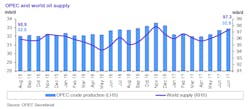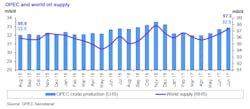Total crude oil production from the Organization of Petroleum Exporting Countries increased 173,000 b/d month-over-month in July to average 32.87 million b/d, according to five secondary sources used in the cartel’s August Monthly Oil Market Report.
Preliminary data indicate that global oil supply increased 170,000 b/d month-over-month in July to average 97.3 million b/d.
Libya output gained 154,000 b/d from June to just more than 1 million b/d. Nigeria rose 34,300 b/d to 1.75 million b/d. Both countries were exempted from the deal by OPEC and certain non-OPEC members to collectively curb output, but Nigeria recently agreed to cap its output at 1.8 million b/d.
Saudi Arabia, the leader of the output curtailment deal, lifted its output by 31,800 b/d from June to 10.07 million b/d. Smaller increases were also seen from Iran, Equatorial Guinea, Ecuador, Gabon, and Qatar.
Production from Iraq fell 33,100 b/d from June to 4.47 million b/d. Angola dropped 19,300 b/d to 1.65 million b/d. Venezuela declined 15,800 b/d to 1.93 million b/d. Smaller decreases were seen from Kuwait, UAE, and Algeria.
OPEC said non-OPEC supply rose 520,000 b/d in July to average 64.49 million b/d, mainly driven by Canada, Norway, the US, OPEC NGLs, Ghana, Colombia, Brunei, and Congo, which partially offset declines in the UK, China, Mexico, and Azerbaijan.
OPEC revised down forecast non-OPEC oil supply growth for 2017 by 28,000 b/d to 780,000 b/d, representing total non-OPEC supply of 57.77 million b/d.
Global oil demand is projected to average 96.49 million b/d in 2017, with demand growth expected at 1.37 million b/d following an upward revision of 100,000 b/d mainly reflecting better-than-expected second-quarter data from regions in the Organization for Economic Cooperation and Development, OPEC says.

